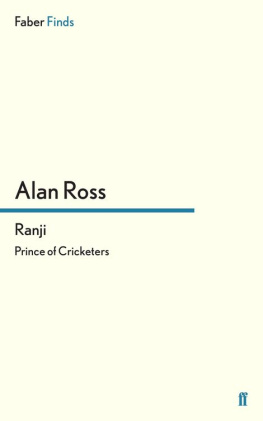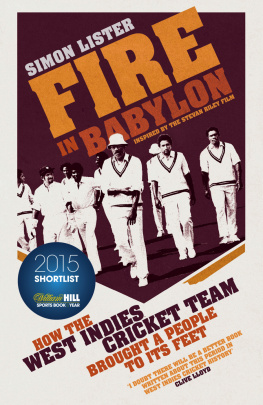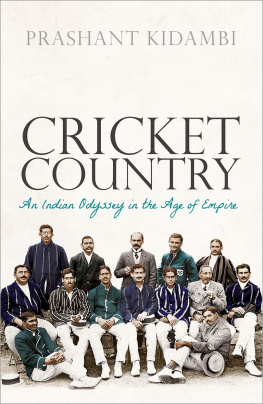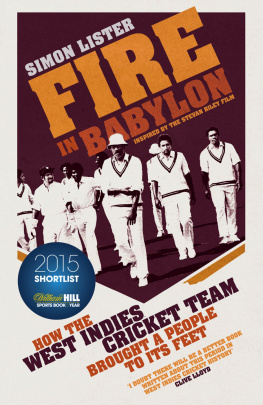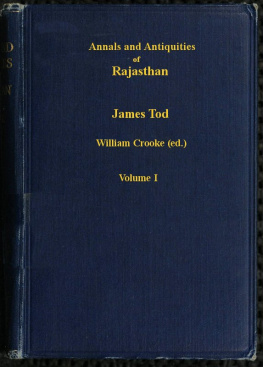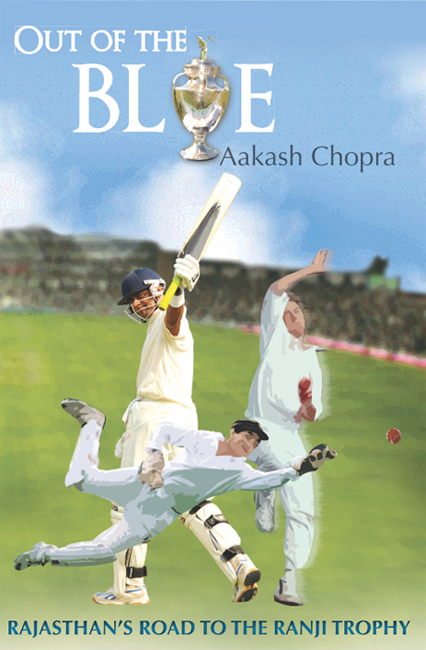
Out of the Blue
The Story of Rajasthans Ranji Win
Aakash Chopra

An Imprint of HarperCollinsPublishers
To my parents, who weathered the worst so I could realize my dreams.
To my sister Aekta, whos been my guiding angel.
And to Aakshi, my wife, for being there, unconditionally.
Contents
W hen you are Rajasthan, last in the Plate division, never having won the title, never even coming close to a final in over three decades, you dont play to win the honour, you play to save what you can of yours.
I t was early February, and early on a Monday morning. A screeching alarm had woken me up at 6 a.m. It was cold and still quite dark. I put on the geyser, packed my training gear and picked up the newspaper. My mornings have always been well-ordered; I like it that way. On days that a gruelling session or a match lay ahead, my morning to-do list would have been all chalked out in my head the night before. Ever since I started playing cricketeven as a kid, all of eightmy mornings were dedicated to practice, workouts or even simply a jog. So unvarying was my regimen that I tended to forget what day of the week it was. Every morning looked the same, and so did my plan. But this morning of a Monday in the first week of February, cold and dark, was differentso different that I vividly remember every bit of it to this day.
Wed been practising for a while for the domestic one-day matches, and I was beginning to hit the ball well. It hadnt been the best season so far and I knew that it was time to set things right. At the end of practice on Saturday, Id left my kit bag, which had all my playing gear, in the dressing room. This is what most players do, to save ourselves the bother of lugging that heavy bag around. Naturally, I had no idea of what was to come.
The Ranji Team for the domestic one-day games had been announced, and the mornings newspapers were carrying the lineup. I was curious about which new names had found their way into the team. But something was hugely awry. The players Id known would make it to the team were all on the list. The ones that got no attention in all these days of practice had been taken off the list, no surprises there. But the reporter had bungled upbig time. He had to have; why else would my name not be on a list that had carried it for over a decade now (and leading the list, thanks to the double a in Aakash). I went over the list again. This time I read out each name, but no, there was no Aakash Chopra. Was it a printing error, I wondered. Then I counted the number of players in the squad and felt once again that sinking feeling in the pit of my stomach. I felt rudderless. Not for a moment had I considered this preposterous possibilitybut now, as I sat still, blank, I was forced to wrap my head around the idea.
This Monday morning was indeed different, nothing like the mundane mornings that had marked my life so far. This one changed my life forever.
In one of the endless and awfully silent moments that morning, between feeling deceived, stranded and hopelessly despairing, I must have vowed that I would never play for Delhi again. That vow, that sentiment, was so strong that the thought of returning to the dressing room to pick up my kit bagwhich Id left there the day before, thinking Id be back to play on Mondaynever suggested itself.
Was this therather prematureend to my first class career? So be it, I told myself. I wasnt going anywhere to beg favours of anyone. Live and die with dignity, and all the rest of that. Yes, it was the most vulnerable Id ever felt; yet that jolt did manage to shake me out of my complacence.
After several hours of complete immobility, I took stock of my situation. I told my driver to go to the stadium and collect my bag, while I telephoned Ratan Singh, the man who looks after the dressing room and the players, and requested him to pack my stuff and hand it over to the driver. A part of me wanted to call Chetan Chauhan, chairman of the senior selection committee and vice-president of the Delhi & District Cricket Association (DDCA)perhaps he had a thing or two to share, something that would comfort me. I needed to hear something, anything, a little consoling. The other part of me, though, the pragmatic one, and the one that had seen the workings of the DDCA at close quarters, knew the absolute futility of it all.
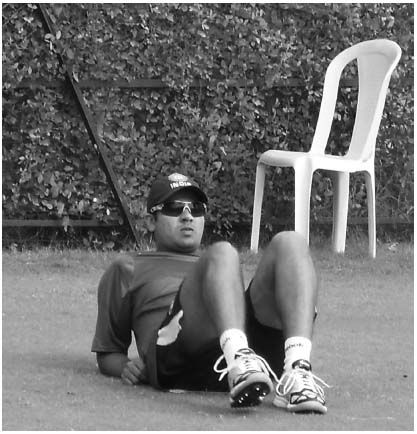
I warm up before a practice session
Still, I called for an answer that I needed to, ought to, hear. Didnt the coach speak to you? Chauhan asked me, awkwardly. No, he hadnt and, frankly, I didnt for a moment think that the coach or anyone else intended to talk to me. Had I missed a hint, perhaps? I had been meeting Vijay Dahiya, the coach and chairman of the selection committee, his colleagues, and the support staff, almost every single day, for ten whole days. I couldnt remember anything in their talk or tenor, not one look that suggested a thing. But it was clear that the decision had been taken long agoscrupulously planned and executed. So, was I on trial for those ten days? If I was, couldnt they see that I was hitting the ball well? But, well, that wasnt the point of it.
Of course, having my name struck off the list was a huge blow. But that is how it is. No matter how brave a face a player presents, there is nothing more hurtful than being booted out of the squad. And if the agony of sitting out isnt enough, a brutally insensitive, hopelessly despotic, and utterly self-absorbed system makes the ordeal worse. Did I notafter representing the association for over a decade-and-a-half, both at the state levels and nationallydeserve, at least, some sort of a warning? I can see those officious faces snapping back: But, we dont have to inform you! By the book, perhaps, you owe me nothing, Sir. But as professionals, as colleagues, could you not have put an arm around my shoulder, sat me down and told me the worst? A sorry state of affairs, indeed: a player, who has dedicated his life, his game and his name to an association, is told that his services are no longer needed, by the press.
This clandestine affair between shoddy officials and the breaking-news media is an old one. It surprises no one that news of players being rested, their inclusion, exclusion and a host of other internal administrative issues find their way to the morning newspapers. Not so long ago, journalists had called me, while I was on my honeymoon, to confirm the latest callous leak. I had been stripped of my duties as captain, they informed me. I was offended, but not surprised. And no, I didnt know before they told me.
A couple of months ago, I had been named Captain, the second year in succession, to lead Delhi in the 200910 Ranji season. Simultaneous with that appointment was the announcement of the squad that would play the season opener domestic T20 matches. Obviously, I wasnt involved in the team selection, but that wasnt a first.
Anyway, Delhi had dropped only one match on its way to the top two slots and had qualified comfortably for the knockouts. We began our Ranji campaign with a match against Vadodara, in which wed enforced a follow-on. Everything went smoothly, except that I had picked up an injury. It got so bad by the second game against Karnataka that I could barely bend my leg. But sitting out wasnt really an option, for we were already thin on resources. Mithun Manhas and Chetan Nanda werent fit and Virat was on national duty. As luck would have it, the track at the Roshanara was not the good batting surface we had hoped for. Winning the toss was crucial; Dravid won it and sealed the match. We managed to save the game by the skin of our teeth. While we muddled through to get a decent result under the circumstances, I got two low scores. My poor run (and my teams) continued into the next match, against Uttar Pradesh. Two injuries before the match and one duringwe didnt go in with a chance. We lost comprehensively, with only Virat Kohli shining at the bat.
Next page



